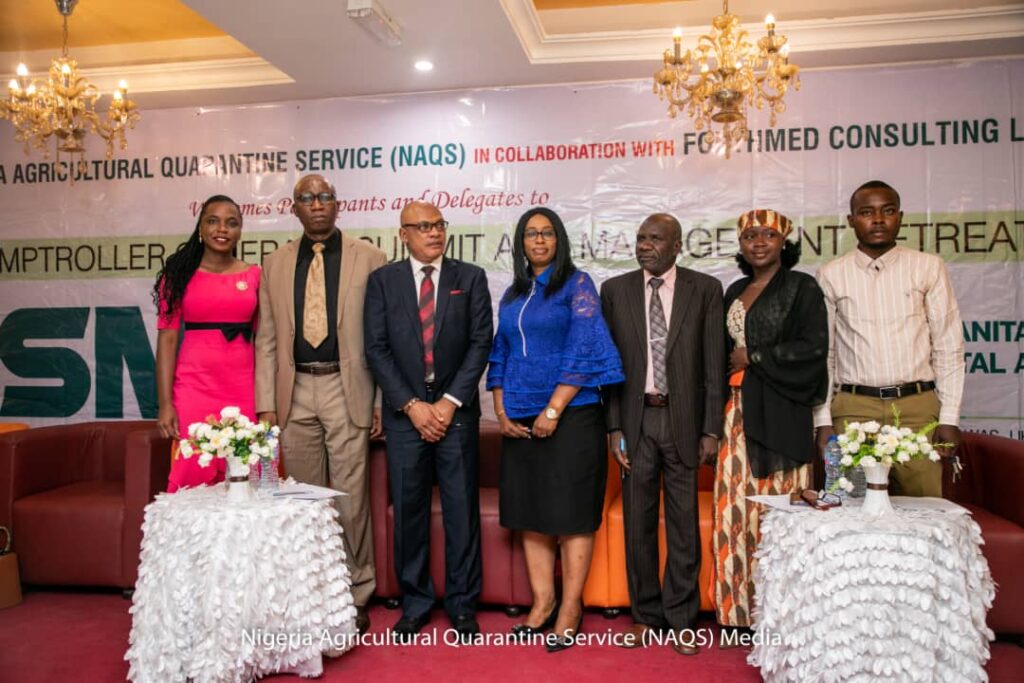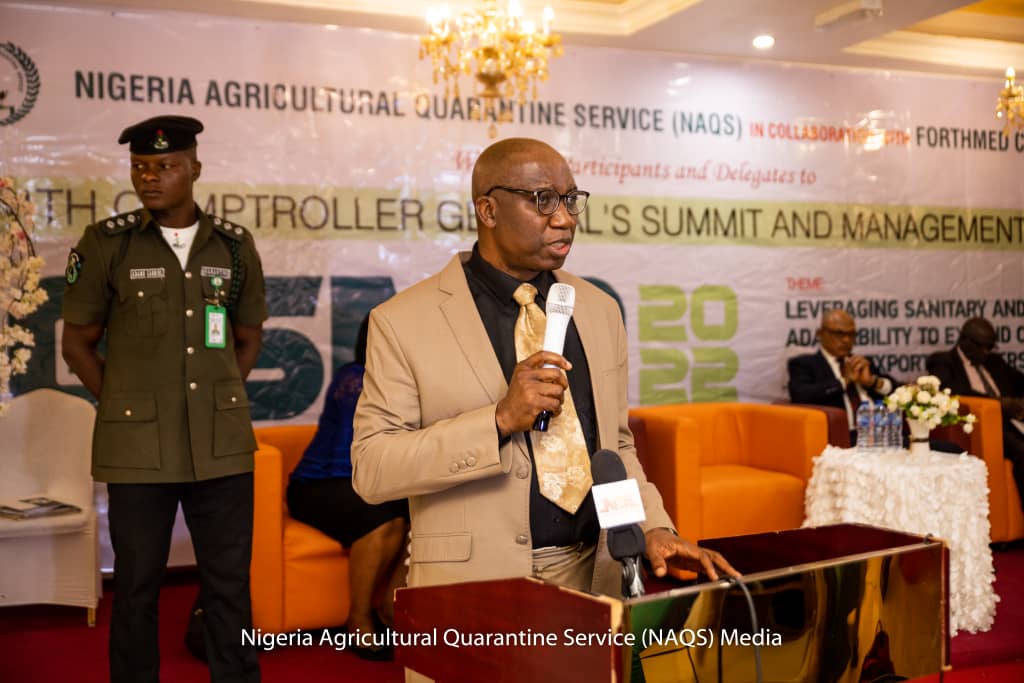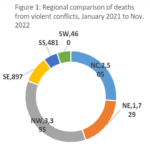By Emma Okereh.

The 4th annual summit of the Comptroller General of Nigeria Agricultural Quarantine Service (NAQS), Dr. Vincent Isegbe, which held in Abuja on Thursday, 8th December, 2022 was as spectacular as it was engaging. Like the previous ones, it threw up a lot of issues for discussions aimed at seeking better ways for effective and efficient service delivery in the agricultural value chain. But unlike the ones before it, the December 8th engagement recorded the attendance of so many stakeholders who were on hand to provide the missing links. The Comptroller General, Dr Isegbe, a workaholic who can best be described as a round peg in a round hole has been exhibiting high level of professionalism in the discharge of his duties since his appointment. He has been churning out policies and programmes that make the Service stand out in the comity of sister agencies and international counterparts. He surely knows how to dig out the hidden treasures such that NAQS remains the agency to beat. The CG’s annual Summit and Management Retreat brings this to bear. Little wonder then, he as usual, stepped out confidently once again to marshall out his plans as well as point the way forward. He informed his audience that
agency holds a stakeholders’ forum as part of the annual Comptroller General’s
Summit and Management Retreat.
He explained that the Comptroller General’s Summit is the most important in-house event on NAQS’s
calendar which serves as a platform for NAQS officers to appraise ”our institutional
endeavors, recalibrate our service culture, and map out strategies to improve our
mandate outcomes in the new year”.
The CG further informed the stakeholders that he always invite sister MDAs and private sector stakeholders, namely, farmers, offtakers, exporters, and producer associations, to join us at the Comptroller General’s
Summit, saying, “We welcome your participation in this engagement because NAQS cannot
effectively interpret its role without the active support and collaboration of our
counterparts in the public sector and the relevant players in the agribusiness
community.
Dr Isegbe further emphasized that NAQS is entrusted with the critical mandate to inspect and certify food and agricultural
products for export and to facilitate international trade. “The nature of our mandate puts
us at the front of the Federal Government’s drive to maximize its vast potential in non-oil exports. Our work is essential any day, any time –it is all the more so considering the dire need for the country to escalate national revenue earning, create jobs for the
teeming unemployed and underemployed youths and lift millions of our citizens out of
poverty.”
“Agro-export intensification will help us to boost our overall agricultural productivity,
generate sustainable wealth, and improve household incomes among the large swath of
the 70% of our population that are engaged in agriculture and agro-allied industries.
The urgent task that must be done is to reposition our food production system to
straddle our local market and the export market like the one and only giant of the
continent.
Under our Export Improvement Initiative and Export Certification Value Chains, we are
seeking to democratize the involvement of micro, small and medium-scale players in
agro-export activities. The diligence of the Nigerian is most evident in the agricultural
sector. Our people toil, in the rain and in the sun, to cultivate crops and rear animals. “
He however noted that the majority of them reside in rural areas. “They eke out their subsistence in
the low returns of the local market. Many of them are unaware of their right to access
the ECOWAS and African Continental Free Trade Area markets. Moreover, they know
little or nothing about export standards. They don’t consider themselves qualified to
export because they presume that only the rich and the affluent can export.”
The CG promised to deploy energy towards that direction. “We are working to overcome this challenge of ‘’the last mile’’ by targeting grassroots
farmers, offtakers, and processors. In the past four years, NAQS has organized scores of
training on export opportunities and export procedures for stakeholders working with stakeholders to mainstream good agricultural practices and
compliance with sanitary and phytosanitary standards in their production,
processing, and value-addition activities; and partnering with MDAs, the states, and local governments to promote the
uptake of the ECVCs and intensification of the production and value addition to premium agricultural products.
“Last month, on 4th November, to be precise, NAQS and its Mexican counterpart body,
SENASICA, signed a phytosanitary protocol to stabilize and grow the export of Nigerian
hibiscus flowers (zobo) to Mexico. The framework is designed to future-proof bilateral
trade in hibiscus between Nigeria and the largest importer of Nigerian hibiscus against
avoidable disruptions. With the signing of the hibiscus work plan, Nigeria will earn US$3
billion annually from exporting hibiscus to Mexico.
“Hibiscus is a metaphor for the countless high-value exportable agro-commodities we
underutilize and take for granted. NAQS highlighted 30 of those products in its ECVCs.
“Every village in Nigeria can produce one or more agricultural products in abundance and
with relative ease. Federal MDAs, states, local government areas, and all actors in the
agricultural value chains have to synergize to mine the country’s comparative
advantage.
“NAQS is 100% pro-agribusiness. And the Agency is continually innovating its systems and
processes to better serve its service users and the public. In line with the Ease of Doing
Business policy of the Federal Government, the NAQS has provisioned its formations for
full automation. The software has been piloted and some designated NAQS officers have
been trained to understand how it works. In the first quarter of 2023, the automation regime will commence, enabling NAQS to function with the cutting-edge technologies
that are used for inspection and certification in developed countries.
“With the automation of our processes, our service delivery will be faster, friendlier, and
more efficient. It will also help NAQS to secure quality data and gain evidence-led insight
into our service delivery, service users, and export/import traffic.”
He stated that at thie engagement, “we hope to discuss with our agribusiness stakeholders the
challenges they are facing and how NAQS can help them start or scale their agro-export
enterprises. We want to explore with our colleagues in other MDAs new efficient ways
to complement one another better. We want to hear from our friends in the media
about how we can amplify our storytelling and attract more Nigerians to agricultural
export promising that the management and officers of NAQS would appreciate observations,
suggestions, and feedback made. ” We are called the Nigeria Agricultural Quarantine Service for
a reason. Service is integral to our job. So, we encourage you to support us to expand
and deepen our impact.” He submitted.
As part of ways to make Nigerian agricultural exports thrive, suggestions were made by stakeholders to the Federal Government to ensure that NAQS lead agency position is not undermined. In order to checkmate incidences of hiding hard drugs in agricultural containers, importers and exporters be made to sign a clearance document attesting that there is no hard hidden drug in the container. The Authority notes that should the input and resolution made at the 2022 summit be implemented to the letter, the Nigeria agric business will surely blossom which will result in a win-win situation for all.



